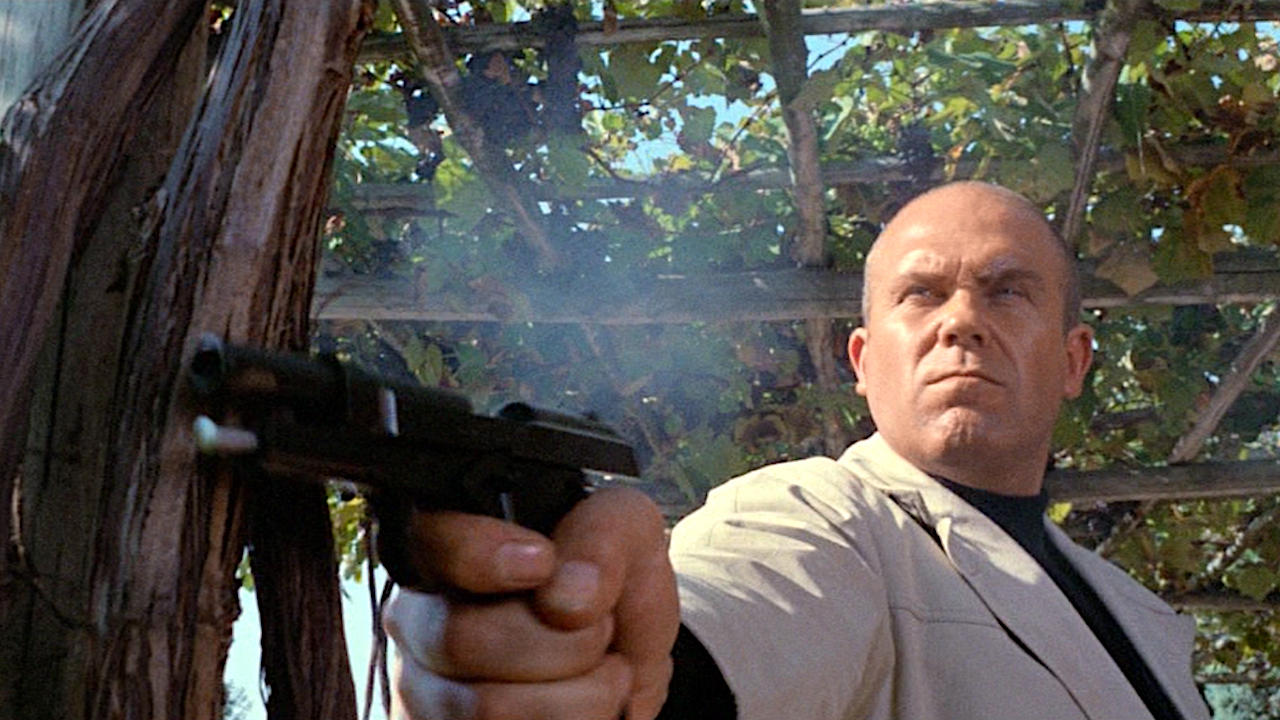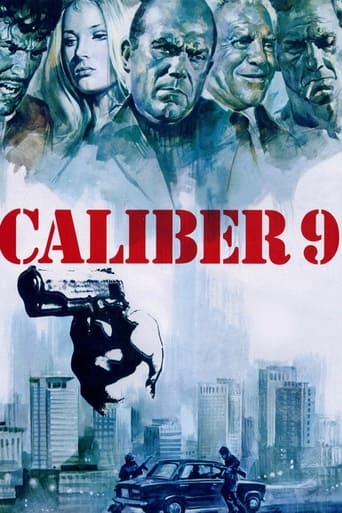



Who payed the critics
Purely Joyful Movie!
A brilliant film that helped define a genre
I like movies that are aware of what they are selling... without [any] greater aspirations than to make people laugh and that's it.
View MoreAfter viewing Castellari's 'High Crime' and Di Leo's 'Milano Calibro 9′ my life-long obsession with Italian crime cinema began in earnest; and a more suitable baptismal font from which to anoint oneself with euro crime's original sin would be hard to find, as 'Milano Calibro 9' remains one of the towering achievements of Di Leo's woefully undocumented career. From the bravura opening montage; where Di Leo creates a tense, dynamic pulse of underworld chicanery, driven to a tumultuous climax by the dense, throbbing, almost baroque jazz funk of, Luis Bacalov (arguably his finest score). And from then on Di Leo is unerring in his fierce vision of violent double dealings and unflinching vengeance, with nary a skipped beat for the film's duration, a rollicking, breathless yarn gloriously undiluted by soft-bellied tangents, or vapid self indulgence. The gangster milieu simply doesn't get any better than this; as much as I dig on Melville's studied, glacial cool, Di Leo's swarthy mise en scene has balls the size of prize winning pumpkins. Some may find all these myriad of hyperbolic blogs dedicated to a Italian crime cinema a trifle perplexing then, oh yes! They discover 'Milano Calibro 9', and in one brutal pole axing knee to the oily conkers it's all over; one can never return to the anodyne world of mainstream cinema without a considerable degree of incredulity. Forget Hubbard, quantum mechanics or Castaneda, this film WILL change your life.
View MoreSome movies you just need to watch a few minutes to know you'll love them. Fernando Di Leo's Caliber 9 opens with a gangster overseeing a criminal operation in a pigeon-occupied plaza. A package containing $300,000 moves across the city, passing from runner to runner, until ending up in the hands of the sadistic Rocco (Mario Adorf), an enforcer for a crime lord. But along the way someone has replaced the bank notes with blank pages. Rocco's revenge is swift and brutal, rounding up the runners one by one and disposing of them in one explosive go. It's a stylish, fast-paced montage, playing to an amazing main theme composed by the legendary Luis Bacalov. Five minutes is all we need to know that Caliber 9 is a violent, mesmerizing, exciting movie.Who stole the money? That's the movie's mystery in this mixture of Italian Poliziottesco and American film noir. The Poliziottesco is a crime/action subgenre of Italian cinema that flourished during the '70s, characterized by its unglamorous and graphic depiction of crime and violence. This came out the same year as The Godfather, and it's interesting to compare how each country portrays organized crime. Coppola's loyal, honourable family has no place in Di Leo's Italy. Rocco has no problems torturing a woman by smashing her face against furniture repeatedly. It's violence divested of entertainment values; the criminals aren't nice and we're not supposed to like them.Rocco and the police think Ugo Piazza (Gastone Moschin), a runner involved in the scheme and who was arrested shortly after for a botched robbery, stole the package. Both Rocco and the Police Commissioner (Frank Wolff) are waiting for Ugo to go get the money. The police see this as an opportunity to arrest Rocco's boss, the crime lord known as The Americano (Lionel Stander).The only problem is that Uzo vehemently denies having taken the money, and he intends to prove it so he can settle down again with his former girlfriend, Nelly (Barbara Bouchet). Ugo could have walked out of an American film noir: a man of few words and fewer friends, caught between brutal thugs and cops who wants to use him as bait, running against time to prove his innocence, he has the typical aura of doom that looms over the lives of film noir protagonists.His only connections in the crime world are the blind Don Vincenzzo (Ivo Garrani), a former Mafia Don, and his bodyguard, Chino (Philippe Leroy), but they refuse to get involved out of principle. If Ugo really stole the money, then he broke rules of conduct amongst criminals. The movie is very ingenious in the way it contrasts a mythical, bygone age of honourable Mafiosi, nostalgically recalled by Don Vincenzzo, and the unchecked vicious thugs controlled by Rocco. The concept of honour comes back to haunt Chino at the end, in one of the movie's many twists.But Ugo is a resourceful guy, capable of withstanding a beating if that will further his goals. Although not the physical type he's smart and we watch him manipulate Rocco, The Americano, the police and Chino like pieces in a chessboard, except he's moving the pieces on each side. Anyone who has seen A Fistful of Dollars or Miller's Crossing may think they know where this is going, but the way Ugo turns everyone against each other is a class act on its own level.The acting is efficient but not stellar. Moschin's subdued performance is the perfect counterpoint to the over-the-top tour de force by Adorf, who bursts into the screen like a wild beast ready to tear his preys apart. Although his performance as a tough, nasty thug lends itself easily to parody, it's also one of the funniest aspects of the movie The movie also suffers from something endemic in Italian cinema from the '70s. At the time almost everyone in the arts was a leftist and usually the films were full of political content. Some directors knew how to incorporate this naturally into the story – Elio Petri's Investigation of a Citizen Above Suspicion does a great job showing the way a fascist cop's mind works, and Bertolucci's The Conformist is a sober portrait of life in Mussolini's regime. Others failed to marry story and content and turned into pamphlets. Such is the case of Caliber 9 at times: actors Frank Wolff and Luigi Pistilli play politically opposed cops and slow down the narrative with conversations about the social causes of crime, the treatment of inmates, political corruption, etc. These scenes seem to belong in another film, and Di Leo only justified not removing them because Wolff and Pistilli deliver great performances.
View MoreCrime novels can be rather dull sometimes, but everyone will agree that some are simply excellent - suspenseful, totally unpredictable and with numerous plot twists. This film is apparently based upon one of the excellent ones. Both silly and intelligent viewers will be kept on the edge of their seat until the very ending, which by the way has an unforgettable quote. When a plot like this is coupled with terrific acting and world-class visuals and music -- the result has to be good.Those sympathetic to early seventies fashion and music are in for a real treat. Osanna/Bacalov's music is totally uncompromising and - in my honest opinion - worth a hundred times the entrance money in its own right. This may be the best soundtrack ever! The visuals are also astonishing - timeless in their beauty, but still with a strong flavour of early 70s. And you'll also catch some glimpses of what must be the world's most beautiful woman.In sum, all this simply makes up a classic. NOT TO BE MISSED! (Those who already own the soundtrack, which actually seems easier to find than the movie, should be advised that the movie has alternate versions, all brilliant).
View MoreThis is an undeservedly little-known gangster movie. The story resolves around the traditionally motive of loyalty, betrayal, and the strange moral code of the Mafia (in Italy), but we are never quite sure what ending the story is going for. The film keeps up the pace nicely throughout and the excellent doubly-twisted ending comes as a total surprise.Gastone Moschin is very good in the lead as the apparent excon and victim of the Mafia's attention, but the acting prize goes to Mario Adorf's Mafia Lieutenant. He also has the best line, right at the end - which I cannot give away as it would spoil the suspense.
View More